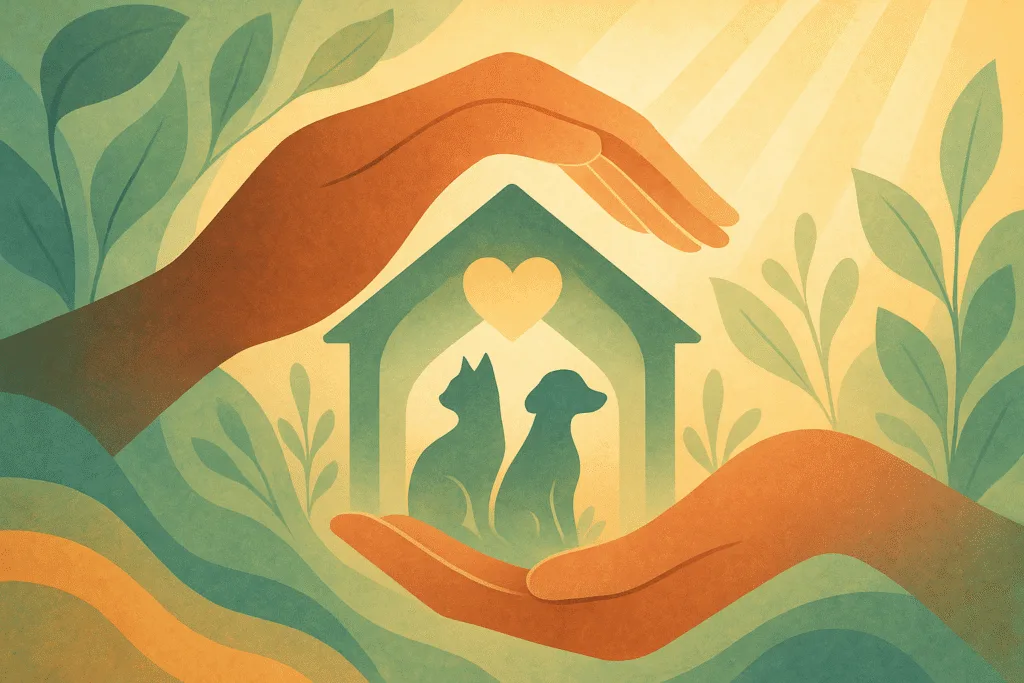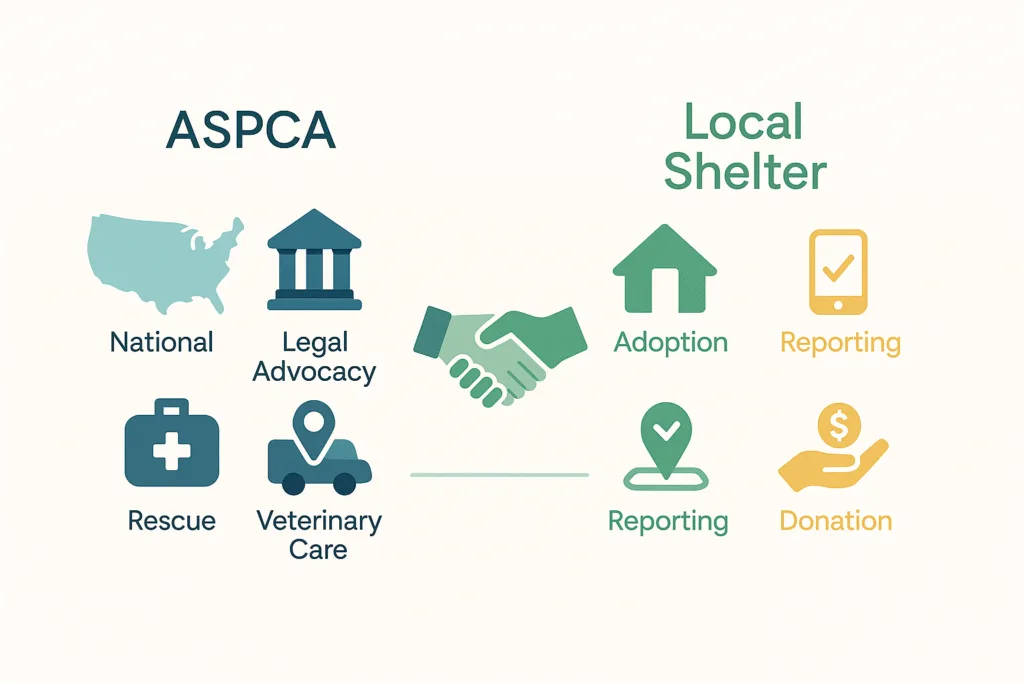
The Ultimate Guide to the ASPCA: Mission, Services & How to Help Right Now
The ASPCA has played a pivotal role in transforming the landscape of animal welfare in the United States. Its work spans from the rescue of abused animals to advancing laws that protect pets and livestock. This guide highlights how the organization began, the vital services it offers today, its legislative impact, and the many ways individuals can take meaningful action to support animal protection efforts across the country. Whether you’re seeking to adopt, volunteer, donate, or advocate, the ASPCA offers clear and impactful ways to get involved.
- What Is the ASPCA?
- What Services Does the ASPCA Provide?
- How Does the ASPCA Influence Animal Law?
- How Can You Help the ASPCA?

Inside the ASPCA: Advocacy, Action & How to Support
The ASPCA operates through four main pillars that define its national impact: a foundational mission to protect animals, a range of life-saving services, strong legal advocacy work, and accessible opportunities for public involvement. Together, these pillars make up a system of rescue, care, reform, and empowerment that touches communities and animals across the country. Understanding each of these pillars will help you see how the ASPCA works and how you can engage with its mission effectively.
What Is the ASPCA? Understanding Its History and Mission
The ASPCA—American Society for the Prevention of Cruelty to Animals—was established in 1866 to solve a foundational problem: at the time, animals in the U.S. had no legal protection. There were no laws preventing mistreatment, no systems in place to rescue or shelter animals in danger, and no formal recognition that animals could suffer or require care.
The ASPCA’s founder, Henry Bergh, believed that legal and societal systems should recognize animals as sentient beings deserving protection. Within a year of its founding, the organization helped pass the country’s first anti-cruelty law and gained authority to enforce it—marking the beginning of formal animal welfare in the United States.
Today, the ASPCA’s mission continues on a national scale. It leads rescue operations, operates adoption and foster programs, provides medical and behavioral care, and advocates for policies that protect animals in homes, farms, labs, and natural disasters. Its work remains rooted in the same principle that launched it: that animal protection is a matter of public responsibility, not private charity.
What Is the ASPCA? Its History, Mission & the Legal System It Helped Create
What Services Does the ASPCA Provide to Animals and Communities?
The ASPCA’s programs are built around solving the most urgent and preventable problems in animal care—like pet overpopulation, emergency access to medical help, and shelter overcrowding. These services are designed to be directly accessible, especially for people with limited income, housing instability, or pets at risk of harm. Below are the core services and the real-world needs they meet:
- Spay/Neuter & Mobile Clinics
If you live in a city like New York or Los Angeles and can’t afford a vet, the ASPCA offers free or low-cost spay/neuter surgeries through mobile vans and community clinics. This helps reduce unplanned litters, cuts shelter intake, and is often available within your zip code. - ASPCA Animal Poison Control Center (APCC)
If your dog eats a household cleaner or your cat chews a plant you can’t identify, the ASPCA runs a 24/7 poison control hotline staffed by veterinarians and toxicologists. They’ll walk you through what to do before you get to the emergency vet.
Call: (888) 426-4435 - Community Veterinary Services
For pet owners who can’t afford basic care like vaccines, microchips, or treatment for common illnesses, the ASPCA offers walk-in clinics and mobile medical services. These are located in neighborhoods with limited vet access and don’t require ongoing coverage or pet insurance. - Adoption & Animal Relocation Programs
If you’re looking to adopt a pet or help reduce shelter overcrowding, the ASPCA lists available animals online and transports pets from high-intake shelters to regions where adoption rates are higher. This gives each animal a better chance at finding a home.
These aren’t just services—they’re lifelines for people and animals in crisis. They exist to reduce suffering, stabilize communities, and keep pets where they belong: safe, healthy, and home.
Top 10 ASPCA Services That Save Lives
How the ASPCA Shapes Animal Rights and Laws
Animal protection laws often feel invisible—until you try to adopt, rent an apartment, escape abuse, or even just buy pet food. The ASPCA works to shape those laws so they protect animals and the people who care for them. Its policy wins include state bans on the retail sale of dogs, cats, and rabbits in pet stores, which block the puppy mill supply chain and encourage shelter adoption.
It also supports tenant protection laws that prevent landlords from denying housing based on pet breed or size. For millions of renters, this means keeping their pets instead of surrendering them due to a move. In crisis settings, the ASPCA champions legislation that funds shelters where people fleeing domestic violence can bring their pets—knowing that 1 in 2 survivors delay leaving because they fear for their animals’ safety.
These efforts are built for real-world impact: fewer animals abandoned, fewer families separated, and more people empowered to care for their pets without legal or logistical threats.
Beginner’s Guide to How the ASPCA Shapes Animal Rights and Laws
How You Can Support the ASPCA Right Now
Supporting the ASPCA doesn’t require a special skill or full-time commitment—just a willingness to act. Whether you can give money, time, or your voice, each option makes a measurable difference in how animals are rescued, treated, and protected nationwide. Here’s how to get involved right now:
- Donate
Your one-time or monthly donation funds rescue missions, emergency surgeries, veterinary supplies, and cruelty investigations. Every dollar supports field responders and shelter teams saving lives in real time. - Volunteer or Foster
From walking shelter dogs to transporting rescued animals or fostering kittens in your home, the ASPCA provides flexible volunteer roles in cities like NYC and LA. No prior experience required. - Adopt a Pet
Adoption gives a rescued animal a permanent, loving home—and makes space for the next animal in need. The ASPCA lists pets online by age, breed, and location so you can find the right match. - Advocate for Animals
Use your voice to change laws. In just a few clicks, you can email lawmakers, sign petitions, or join campaigns to pass stronger protections for animals in your state.
Each of these options supports a different part of the ASPCA’s mission—from emergency rescue to legal reform—but all lead to the same outcome: fewer animals suffering and more animals safe, loved, and home.
How to Support the ASPCA Right Now: 4 Immediate Ways to Help Animals in Need

FAQs
The ASPCA is a national nonprofit that operates rescue, veterinary, legal advocacy, and emergency response programs—far beyond the scope of a single shelter.
No. The ASPCA and local humane societies are separate organizations, though they may partner on adoption events or regional rescue efforts.
In New York City, contact the ASPCA directly. In other areas, report to your local animal control agency or law enforcement department.
Yes. The ASPCA is a 501(c)(3) nonprofit, and donations are fully tax-deductible as allowed by law.
Yes. You can search available pets and apply online at https://www.aspca.org/adopt-pet.
Yes. In cities like New York and Los Angeles, the ASPCA offers community clinics and mobile services that provide low-cost or free care to eligible pet owners.
Be the Reason an Animal Is Rescued Today
The ASPCA offers clear, immediate ways to make a real difference in animal welfare. Whether you’re ready to adopt a pet, support legislation, volunteer in your community, or donate to rescue programs, every action you take helps reduce cruelty, save lives, and protect animals across the country. Choose the path that fits you—and take it today.
